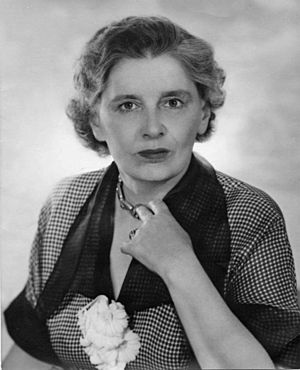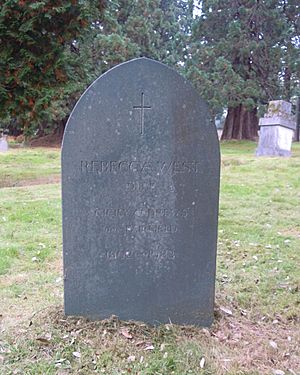Rebecca West facts for kids
Quick facts for kids
Rebecca West
|
|
|---|---|

Portrait of West by Madame Yevonde
|
|
| Born | Cicily Isabel Fairfield 21 December 1892 London, England |
| Died | 15 March 1983 (aged 90) London, England |
| Occupation | Writer |
| Nationality | British |
| Children | Anthony West |
Dame Cicily Isabel Fairfield (born December 21, 1892 – died March 15, 1983) was a famous British writer, journalist, and critic. She was known by her pen name, Rebecca West. She wrote many types of books, including novels, travel books, and articles for newspapers and magazines.
Some of her most important books include Black Lamb and Grey Falcon (1941), which is about the history and culture of Yugoslavia. She also wrote A Train of Powder (1955), which covered the Nuremberg Trials. Her novel The Return of the Soldier (1918) was a story about World War I. Time magazine called her "the world's number one woman writer" in 1947. She chose the name "Rebecca West" from a strong character in a play by Henrik Ibsen.
Contents
Rebecca West's Life Story
Growing Up and School
Rebecca West was born Cicily Isabel Fairfield in London in 1892. Her home was full of books, music, and interesting talks about politics. Her mother, Isabella, was a talented pianist. Her father, Charles, was a journalist. He left the family when Cicily was eight years old. He passed away when she was 14.
After her father left, her family moved to Edinburgh, Scotland. Cicily went to George Watson's Ladies College. She had to leave school in 1907 because she got sick. She later said school felt like a "prison."
Rebecca had two older sisters. Her sister Letitia became one of Britain's first female doctors and a lawyer. Her other sister, Winifred, had children who became close to Rebecca later in life. Rebecca herself trained to be an actress in London. This is when she started using the name "Rebecca West." She and Letitia also joined the women's suffrage movement, which fought for women's right to vote. She wrote for feminist newspapers to support this cause.
Becoming a Writer and Family Life
In 1912, Rebecca West wrote a strong review of a book by the famous writer H. G. Wells. This led to them meeting and becoming friends. They had a son named Anthony West, who was born in 1914. Their friendship continued until Wells passed away in 1946.
Rebecca West became well-known for her writing about women's rights and social issues. She wrote essays and reviews for many newspapers and magazines. A famous writer, George Bernard Shaw, once said in 1916 that Rebecca West could write "brilliantly and much more savagely" than he could.
In the 1920s, West often visited the United States to give talks and meet other artists. She became friends with many important people, including Charlie Chaplin. In 1948, President Truman gave her an award for her journalism, calling her "the world's best reporter."
In 1930, when she was 37, she married a banker named Henry Maxwell Andrews. They stayed together until he passed away in 1968. Rebecca West earned a lot of money from her writing. By 1940, she owned a Rolls-Royce car and a large country home. During World War II, she welcomed refugees from Yugoslavia into her home. She also used her land to grow food and raise animals.
Later Years and Important Works
As Rebecca West got older, she became very interested in big political and social issues. She wanted to understand why people caused so much harm to each other. Before and during World War II, she traveled a lot to gather information for her books.
From 1936 to 1938, she visited Yugoslavia three times. She loved the country and saw it as a very important place in European history. Her book Black Lamb and Grey Falcon shares her thoughts and experiences from these trips. It is considered a masterpiece.
She also reported on the Nuremberg Trials for The New Yorker magazine. These trials were held after World War II to judge important Nazi leaders. She wrote about this experience in her book A Train of Powder. In 1950, she was chosen as an honorary member of the American Academy of Arts and Sciences.
She continued to travel even when she was old. In the 1960s, she made two long trips to Mexico. She was very interested in the local culture there.
Old Age and Final Works
After her husband passed away in 1968, Rebecca West moved to a large apartment in London. She continued to write a lot. She wrote reviews for The Sunday Telegraph and published her last novel, The Birds Fall Down (1966). Her last work published while she was alive was 1900 (1982), which looked at the last year of Queen Victoria's reign.
She also worked on sequels to her novel The Fountain Overflows. She wrote a lot for these books but was never happy enough to publish them. Many of her writings were published after she passed away.
Relationship with Her Son
Rebecca West's relationship with her son, Anthony West, was difficult. Anthony was also a writer. In 1955, he published a novel called Heritage, which was a fictional story based on his own life. Rebecca West was very upset because she felt the book showed her in a negative way. She stopped talking to her son and tried to prevent the book from being published in England. It was only published there after her death. This sadness about her son lasted until she passed away.
Death
In her last years, Rebecca West had problems with her eyesight and health. She passed away on March 15, 1983, at the age of 90. She is buried in Brookwood Cemetery.
After she died, William Shawn, the editor of The New Yorker, said she was "one of the giants" of English literature. He said she wrote "dazzling prose" and understood people very well.
A special blue plaque honors her childhood home in Edinburgh.
Rebecca West's Views
Politics and Beliefs
Rebecca West grew up in a home where world events were often discussed. Her father was a journalist who talked about many different issues. These discussions helped shape her own ideas. She learned early on how easily people could be unfair to minorities or suspect others without good reason.
She was a strong supporter of women's rights and was active in the suffragette movement. However, she also sometimes disagreed with the tactics used by some leaders of the movement.
When the Bolshevik Revolution happened in Russia, many people on the left side of politics saw it as a new, better world. But Rebecca West, even though she considered herself a socialist, had doubts. She didn't think events in Russia were a good example for other countries. She felt that the new leaders in Russia were too violent.
She was also very against fascism, which was a dangerous political idea in Europe. She criticized both her own country's government for trying to avoid conflict with Adolf Hitler and other left-wing groups for being too peaceful. She felt neither side truly understood how evil Nazism was. She also did not trust Joseph Stalin, the leader of the Soviet Union.
After World War II, her strong anti-communism grew even more as she saw many Eastern European countries come under Soviet control. She believed that communism, like fascism, was a type of government that took away people's freedom.
Even though her anti-communism was liked by some conservatives, she never thought of herself as one. She voted for the Labour Party in Britain after the war. She also admired Margaret Thatcher, not for her policies, but because Thatcher was a woman who rose to a top position in a male-dominated world.
Rebecca West's strong belief in speaking her own mind, even when it was unpopular, was a key part of who she was. Many writers stopped reading her work because she held views that were different from theirs.
Religion and Spirituality
Rebecca West was baptized into the Church of England and considered herself a Christian, but she had her own unique beliefs. Sometimes she felt God was unfair, and other times she thought God was not powerful enough. However, she deeply respected Jesus and the artistic expressions of Christianity. She believed faith could help people understand life's mysteries.
She often wrote about the Bible and church history, but she didn't always follow traditional religious rules. For example, she didn't believe in the virgin birth or Original sin. She also strongly disagreed with the idea of the Atonement, which suggests that pain is needed for good things to happen. She wrote that this idea was "pure nonsense" and that a fair God would not forgive people because someone else suffered.
World War II made her beliefs more traditional for a while. In the early 1950s, she even tried to become a Catholic, but it didn't last long. Later in her life, she again showed a deep mistrust towards God, especially because of the suffering in the world.
West was also interested in Manichaeism, an ancient belief that the world is a mix of light and darkness. She saw this idea as a "useful conception of life" because it showed that people have both good and bad parts. She believed that the tension between opposites, like light and darkness, or men and women, was important for life and creativity. She wanted women to have equal rights, but also to keep their unique qualities. She believed that men and women were fundamentally different, with men having a tendency towards violence and women towards life. She felt that love and women's freedom were important to make these differences work well together.
|
Rebecca West was one of the giants and will have a lasting place in English literature. No one in this century wrote more dazzling prose, or had more wit, or looked at the intricacies of human character and the ways of the world more intelligently.
See also
 In Spanish: Rebecca West para niños
In Spanish: Rebecca West para niños


